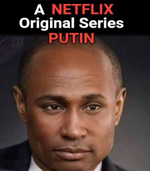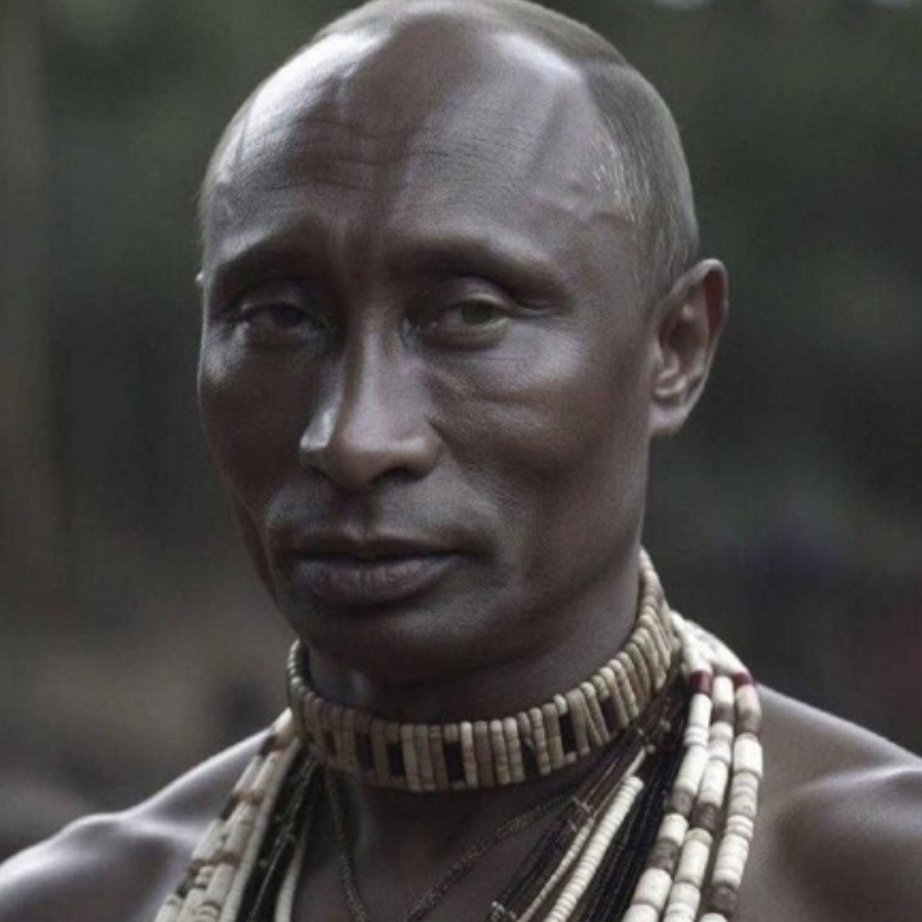You are using an out of date browser. It may not display this or other websites correctly.
You should upgrade or use an alternative browser.
You should upgrade or use an alternative browser.
The Vladimir Putin Thread
- Thread starter Caduceus
- Start date
-
- Tags
- public figures
Full text
President Vladimir Putin is a Russian Orthodox man who grew up in a deeply Atheistic society.
He did not have the luxuries many Orthodox Christians experience today. No spiritual father, no Christian upbringing. Christian identity was suppressed, he was not catechized properly growing up, the education system indoctrinated young Soviet people into believing nonsense (such as Darwinism, historical marxism).
This is why we see over the last 20-years, a continued transformation of his character, under the influence of his Orthodox peers - he is overcoming decades of Communist ideology, which infect many of the baby boomer Soviet generation.
To me, what he has done - and continues to do, in good conscience, will be judged by God. I personally believe it is mostly good. We see him improving before our very eyes, slowly but surely, and I hope that this personal growth continues, to the benefit of the Russian Christian people.
Russia rises, it is taking off the Talmudic Bolshevik & Masonic noose which has tied it down by the neck for almost 80-years. An end to the dark ritual is almost here, and President Putin has contributed to this freedom, to the best of his humble ability.
Hey Vlad, if you're listening, next time you speak mention the chews in a negative light.
Hey Vlad, if you're listening, next time you speak mention the chews in a negative light.

I'm reading the description of a TV documentary about the mafia and banks, and it says, among other things
After the appointment of former KGB agent Vladimir Putin as president, a mafia-like state policy begins in 2000. Organized crime supports the Kremlin. Capital flight reaches astronomical proportions, and banks set up veritable money-laundering pipelines on the territory of the former Soviet Union.
Hence my question: is it true?
After the appointment of former KGB agent Vladimir Putin as president, a mafia-like state policy begins in 2000. Organized crime supports the Kremlin. Capital flight reaches astronomical proportions, and banks set up veritable money-laundering pipelines on the territory of the former Soviet Union.
Hence my question: is it true?
I'm reading the description of a TV documentary about the mafia and banks, and it says, among other things
After the appointment of former KGB agent Vladimir Putin as president, a mafia-like state policy begins in 2000. Organized crime supports the Kremlin. Capital flight reaches astronomical proportions, and banks set up veritable money-laundering pipelines on the territory of the former Soviet Union.
Hence my question: is it true?
Who's asking the question?
I'm reading the description of a TV documentary about the mafia and banks, and it says, among other things
After the appointment of former KGB agent Vladimir Putin as president, a mafia-like state policy begins in 2000. Organized crime supports the Kremlin. Capital flight reaches astronomical proportions, and banks set up veritable money-laundering pipelines on the territory of the former Soviet Union.
Hence my question: is it true?
The opposite is true.
"Be my wife, Svetlana Igabugu, and together we shall unite the 5 tribes of the Serengeti and rule the wastelands as King and Queen."
The opposite is true.
Of course you're going to have massive capital flight and money laundering if oligarchs are fleeing.
Of course you're going to have massive capital flight and money laundering if oligarchs are fleeing.
Honestly, it's painful but not a big deal. Capital flight is a small price for freedom.
Honestly, it's painful but not a big deal. Capital flight is a small price for freedom.
I'd love to live in a mountain cabin near a creek with my dignity intact.
Watch Full Video of Vladimir Putin's Interview With Rossiya Segodnya Chief Kiselev
Two weeks after his address to the Federal Assembly, Vladimir Putin gave an interview to Dmitry Kiselev, the director general of Rossiya Segodnya, Sputnik's parent media group. Putin declared Russia's nuclear readiness, named terms of peace talks on Ukraine and covered the resistance of national economy. Read the full text of the interview below.https://sputnikglobe.com/20240313/v...ossiya-segodnya-chief-kiselev-1117297434.html
https://dailystormer.in/putins-big-russian-interview-is-way-more-hardcore-than-his-tucker-interview
https://videon.img.ria.ru/Out/Flv/direct/2024_03_13_recording_hy4jrbaz.ihg.mp4
https://files.catbox.moe/yuvtks.mp3
Congratulations Vladimir Vladimirovich Putin on a record breaking electoral mandate to serve another 6 years as president of Russia.
Putin won 87.8% of the vote, the highest ever result in Russia’s post-Soviet history, according to an exit poll by pollster the Public Opinion Foundation (FOM). The Russian Public Opinion Research Centre (VCIOM) put Putin on 87%. First official results indicated the polls were accurate.
By the way, the US has only ONE organization doing exit polling, and it is controlled by the same media groups that report its results. And voter turnout in America has never approached what Putin is getting.
US President Bill Clinton, when peppered with obnoxious questions by Pierce Morgan, says Putin is honest, and never once went back on his word. Say what you will about Clinton, but he was the last US president who was both a) intellectually curious and b) capable of making any independent decisions.
Three cheers for the most distinguished, competent, and loved leader in the world today.

Putin won 87.8% of the vote, the highest ever result in Russia’s post-Soviet history, according to an exit poll by pollster the Public Opinion Foundation (FOM). The Russian Public Opinion Research Centre (VCIOM) put Putin on 87%. First official results indicated the polls were accurate.
By the way, the US has only ONE organization doing exit polling, and it is controlled by the same media groups that report its results. And voter turnout in America has never approached what Putin is getting.
US President Bill Clinton, when peppered with obnoxious questions by Pierce Morgan, says Putin is honest, and never once went back on his word. Say what you will about Clinton, but he was the last US president who was both a) intellectually curious and b) capable of making any independent decisions.
Three cheers for the most distinguished, competent, and loved leader in the world today.
US President Bill Clinton, when peppered with obnoxious questions by Pierce Morgan, says Putin is honest, and never once went back on his word. Say what you will about Clinton, but he was the last US president who was both a) intellectually curious and b) capable of making any independent decisions.

Watch Full Video of Vladimir Putin's Interview With Rossiya Segodnya Chief Kiselev
Two weeks after his address to the Federal Assembly, Vladimir Putin gave an interview to Dmitry Kiselev, the director general of Rossiya Segodnya, Sputnik's parent media group. Putin declared Russia's nuclear readiness, named terms of peace talks on Ukraine and covered the resistance of national economy. Read the full text of the interview below.
https://sputnikglobe.com/20240313/v...ossiya-segodnya-chief-kiselev-1117297434.html
https://dailystormer.in/putins-big-russian-interview-is-way-more-hardcore-than-his-tucker-interview
https://videon.img.ria.ru/Out/Flv/direct/2024_03_13_recording_hy4jrbaz.ihg.mp4
https://files.catbox.moe/yuvtks.mp3
Nice interview link, Bird.
The most interesting part was on demographics, IMO:
Dmitry Kiselev: You mentioned reducing the tax burden on large families. Children and the demographic situation – these topics were very extensive in your Address. Indeed, the issue is quite painful, because demographically Russia is melting away. Last year was an anti-record of birth rate.
Vladimir Putin: I think the birth rate was 1.31 or 1.39….
Dmitry Kiselev: It’s 1.39 children per woman capable of child-bearing.
Vladimir Putin: Of childbearing age.
Dmitry Kiselev: Perhaps ideally we should double it – [to a ratio of] three. Because this is literally a disaster for society.
You have proposed a fairly large-scale programme to support motherhood and demographic stimulation. Is there any confidence that these measures will reverse the downward trajectory to an upward one?
Vladimir Putin: On the whole, there are plans to spend, through various channels, up to 14 trillion rubles on all measures to support families with children over the six-year period. It is an enormous amount of money.
There are numerous areas of support for families with children – from general social support, such as building or renovating kindergartens, building new schools and renovating old ones, modernising them in accordance with the present-day needs, to supporting women from pregnancy till the child turns 18. Allowance is currently paid to nearly 400,000 women, which is almost every third pregnant woman. Over ten million children receive child benefit. This is a serious thing.
We have kept the system of maternity capital. We have continued with the payments of 450,000 rubles for mortgage repayment to families where a third child is born – the relevant decisions are underway. We have preserved mortgage benefits for families with children. In other words, there is a whole package of very diverse family support measures.
Of course, as you have already mentioned, this is also about fighting poverty, because, obviously, families with children face way more difficulties than childless families, which is no surprise as the expenses are huge. Nevertheless, we have achieved considerable progress in this area.
Thus, 20 years ago we had, I think, 29 percent of the population, or 42 million people, living below the poverty line. Today, according to the latest reports, we have 9.3 percent, which is still 13.5 million people. A very large number, indeed. We need to do everything possible to bring it down to at least seven percent. As for families with many children, the figures are more modest, but they also need to be improved.
What are we referring to when speaking of poor birth rates? I have already said many times, and experts say this, – these are objective things – that we have had two dramatic declines in the birth rates. One was in 1943‑1944, during the Great Patriotic War. A comparable decline followed immediately after the collapse of the Soviet Union, a very similar one, with the same decline in the birth rate.
The reason is clear: the breakdown of the social support system. No matter how weak it was in the USSR, it was there anyway, but after the collapse of the Soviet Union it basically ceased to exist, leading to widespread poverty. There is no need to explain. Anyway, the planning horizon of a family shrank; the birth rate went down to that of the war years. Then we had a rebound. And now we have quite a large number of children, young people who will reach adulthood and childbearing age in a few years, and we assume that the rates will go up.
What you have mentioned is a worldwide trend. There are only a few developed countries that have positive demographic dynamics, while in the rest of the developed world everything is on the decline. This is a complex problem, which has to do with the economy, as well as life priorities of women. It is better not to interfere right now, let the demographers deal with it and come up with a solution.
But you know what is encouraging? The public sentiment. In Russia, 70 percent of men and 72 percent of women would like to have two or more children, and the state should support them in that regard. We are working on an extensive package of support measures which need to be implemented, and we will do that.
Dmitry Kiselev: However, there is still no certainty that those measures will turn the situation around.
In the late 1990s – it is a well-known story which you have spoken of yourself – you saved your children from fire: you went into the burning building, to the second floor. It was not until later that you remembered about the money left in the house. The money burnt. This shows your priorities: children first, then money.
Maybe the same approach should be adopted on a nationwide scale? Not just 14 [trillion], but to go all in – to launch such a programme that would guarantee a turn of the tide?
Vladimir Putin: You know, you have to, as they say, follow the developments. In the early 2000s, we introduced a number of demographic initiatives, including maternity capital, and a number of other measures, which have produced tangible positive results. This means we are capable of achieving desired goals.
Dmitry Kiselev: So we already have the relevant experience?
Vladimir Putin: We have the experience, for sure. Using this experience and other best practices, we should ultimately aim to achieve the goals we set for ourselves. As the situation changes, we will adjust the existing measures or supplement them with something else.
For instance, we have declared the year 2024 the Year of the Family. We have launched a new national project entitled ”Family.“ It includes elements that we have never used before. For example, there are plans to allocate 75 billion [rubles] to regions where birth rates are lower than the national average. These are mostly the central regions of Russia and the country's northwest. 75 billion is a decent amount of money. It is just that they need to be used wisely.
Elderly care is another aspect. There are other support measures as well. By raising the birth rate and increasing life expectancy, we will be able to stabilise the country’s population. This is the main overall indicator that will either demonstrate our success or, possibly, highlight the need for greater attention to the relevant work from all administrative and government bodies.
Dmitry Kiselev: Sure, but there is also a third tool for solving demographic problems all over the world, and that is immigration. What figures can we expect for this six-year period and what does the systematic approach in this work means?
Vladimir Putin: As for migrant workers, we do not have many immigrants in our country compared to other countries: they make up 3.7 percent of the total number of workers. But they are concentrated in the regions with the highest economic activity, and there are certainly more of them out there. These are the Moscow Region, Moscow, the Northwestern region and some regions in the North, where they have decent salaries. However, no doubt, this is an issue that requires special attention on the part of the authorities, both local, regional and federal.
What else I would like to add here? It is a very important thing. When labour migrants are attracted, they always say it is necessary to do so because of the shortage of workers. Our entrepreneurs should understand that the situation for them in terms of labour availability will not change for the better in the coming years – they will face labour shortages.
I would like to repeat once again that in order to solve this issue in a totally different way it is necessary to increase labour productivity and reduce the number of workers in those areas where it can be done, achieving even greater results by introducing modern technologies. As we have already discussed, this requires investment in this area and personnel training. This is the primary thing we have to think about.
Generally, of course, migration policy is an important economic tool. There is no harm in looking at the lesson learned of other countries. First and foremost, of course, we should talk about the repatriation of our compatriots. The concepts of repatriation and compatriots are already reflected in our regulatory framework, there is no need to repeat them here.
We should talk about attracting people who perhaps do not intend to move to the Russian Federation, but by virtue of their qualifications and talents in various fields can make a significant contribution to the development of our state, to the development of Russia. We would be glad to attract such people as well.
As for traditional labour migrants, we also need to think about ways to prepare them for coming to Russia, including with our partners in the countries where they permanently reside. This includes studying the Russian language, our traditions, culture, and so on. It is necessary to look after them here too, to treat them humanely. In other words, it is necessary to make efforts to integrate them into our society in a natural way. All of this together should have a corresponding, I hope, positive effect.
Naturally, everyone should observe our traditions and the laws of the Russian Federation. And, certainly, sanitary and other norms must be strictly observed. Ensuring the security of citizens of the Russian Federation must come first.
---
As we can see, Putin and Russians take demographics very seriously. They aren't interested in replacing their people with low IQ savages, and they are actively spending huge sums of their tax base on supporting married families.
I pray they will be successful, and, because they align themselves with God and have support of the Church, it is certain they will be successful. Russia will probably be the last country on Earth in 200 years from now with a large White majority.


